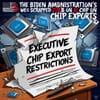The US has scrapped the Biden administration's curb on AI chip exports due to intense industry backlash. The regulation, known as "AI Diffusion," aimed to limit AI chip sales to "non-trusted actors," particularly China. However, tech giants like Nvidia and Microsoft strongly opposed the rule, citing its complexity and potential to stifle American innovation.
The Commerce Department ultimately agreed with the industry's concerns, describing the rule as "overly complex" and "overly bureaucratic," stating it would "stymie American innovation." The tiered system, which categorized countries into three tiers based on their access to AI chips, was deemed unenforceable.
In response, the Commerce Department plans to introduce a simpler rule that promotes American innovation and ensures US AI dominance. The administration may replace the tiered system with individual agreements between the US and each nation, alongside a global licensing regime. Nvidia has welcomed the administration's new direction on AI policy, seeing it as an opportunity for the US to lead the next industrial revolution and create high-paying jobs.
The move is expected to impact trade talks, with countries negotiating better tariffs in exchange for adhering to chip restrictions. The outcome will likely shape the future of AI chip exports and the US's position in the global AI market.


